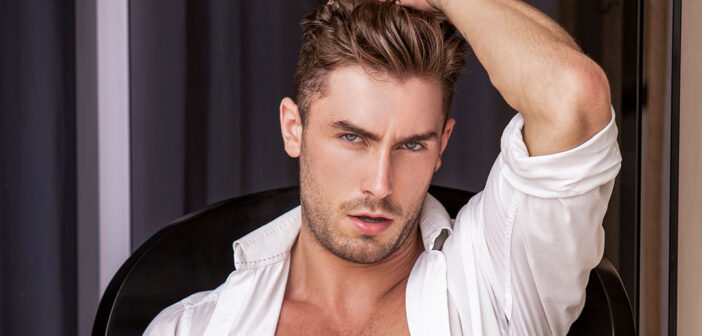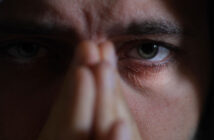I recently found a long-lost news clipping I once kept pinned to the cork board next to my desk years ago.
The headline reads:
Beautiful Losers: Half Of Gay Men Surveyed Would Give Up A Year Or More Of Their Lives For The Perfect Body
I don’t remember what magazine the article came from, but its message stuck in the back of my mind like a splinter all these years.
Some backstory: a UK-based study was conducted between the Central YMCA, the Succeed Foundation, and the Centre for Appearance at UWE Bristol back in 2011. Body image was the topic in question, and 394 men were surveyed.
Of the gay men participating, 48 percent said they’d sacrifice a year or more of life for a perfect body. The study also revealed that 10 percent of gay men would give up 11 years of life if physical perfection was granted instantaneously. The surveyed gay men further reported a strong admiration for the “traditional Western standard of male attractiveness: a tall, lean, muscular, and toned body with clear skin and a full head of hair.”
But does a decade-old study still hold up?
To get a better idea, I asked the opinion of three gay men who have built careers on looking good.
“Talk In A Deeper Voice”
Craig Marks is the first man I discussed this with, and he believes the article’s message still has merit.
Craig is a model, adult performer, and arial acrobatic artist who has what almost anyone would define as a “perfect body.” He’s young, tall, handsome, and his physique is at peak condition. Despite that, Craig has no problem finding imperfections with his body and appearance if he lets his mind wander long enough.
“The issue with body image among [gay men]is a need to please others or to look appealing to others and get validation,” Craig says. But if Craig Marks—a man whose career revolves around his good looks and peak physicality—can’t be completely at ease with his body image, what does that say about the collective psyche of gay men?
Craig believes it’s subjective, and it’s not all about how squared your jaw is or how defined your abs are. Depending on who is doing the evaluating and why, criticisms arise that stir up all kinds of insecurity.
“I’ve been told to shave my beard so I look younger or talk in a deeper voice to [sound]more manly,” Craig says.
Bullied And Small-Framed
Conquering feelings of insecurity is Jordan Starr’s entire motivation for getting into modeling and adult entertainment.
When I first interviewed Jordan for a brief profile I wrote in January 2023, he was direct and honest about his personal transformation.
“I was a bullied, small-framed, and long-haired [guy]who eventually went to the gym and got a haircut. I suddenly started getting a ton of attention. This developed into a super enjoyable outlet to express myself in a sex-positive way,” Jordan said at the time.
I reconnected with Jordan Starr and asked him to elaborate further.
“My philosophy is mind, body, and spirit,” Jordan says. ”It’s a full-circle, holistic approach. Each is important, and you can’t survive if you should lose any part.”
Jordan is quick to say he’s aware he’s not “perfect,” but he still strives to stay on track with his physical fitness and lifestyle as much as possible. The scrawny and bullied gay kid he once was is never far from Jordan’s mind.
But he uses the uncomfortable memories as motivation, and he meets his goal at least 80 percent of the time. And even when he desperately wants to succumb to a day of laziness and apathy, he forces himself to persevere and hit the gym.
“It might just be watching Netflix on the treadmill, but I’m still there,” Jordan says.
Time, Hard Work, And Consistency
The broad strokes of Harold Lopez’s childhood are similar to Jordan Starr’s.
Harold was small and underweight when growing up in Puerto Rico. But you’d never guess it seeing him today. Harold stands nearly six feet tall and weights 180 pounds. It’s all muscle.
“I was insecure about my body because I felt too skinny. It took me time, hard work, and consistency to gain weight,” Harold says.
But Harold knew early on he was not going to give in to his insecurity, and instead transformed it into a solid exercise routine and healthy diet that helped him build the body he’s always wanted. Maintaining an ideal body image is Harold’s end goal, and his choices reflect that.
“I like to have a balance between a good exercise routine and good diet to maintain the body that I want,” Harold Lopez says. “Everybody is different and needs different routines to reach their goals.”
“Too Ugly To Be Gay”
Can the quest for a good body go too far and turn into an obsession? When is “good” not good enough and turns into a fixation on perfection?
The idea that gay men use their good looks and sex appeal to regulate turbulent emotions has been around for years. One man who actively analyses this pattern of behavior is Dr. Alan Downs, who wrote about the quest for physical perfection among gay men in The Velvet Rage: Overcoming the Pain of Growing Up Gay in a Straight Man’s World.
In the book, Downs proposes that many westernized gay men grow up with a core “toxic shame” rooted in the discomfort and rejection of their sexuality. And as these gay men grow older, they regulate these intense feelings of insecurity through maladaptive and addictive behaviors. The goal is always the same—to earn external validation.
If a gay man can always be in the best shape and always look young, then his sex appeal will never fade, right? If his physical appearance and attractiveness is ensconced in perfection until death, then isn’t that all that matters?
The hope is “yes.”
Interestingly, Downs highlights research that shows there’s a “sizable minority” of gay men who engage in high-risk sex because they’d “rather die young than grow old.”
And judging by the anecdotal evidence out there, the overall issue still persists.
According to reporting by the BBC, some gay men have been told they’re “too ugly to be gay.”
Nick Levine reported on this phenomenon for GQ in 2020. He cited a 2017 survey conducted by Attitude magazine where 84 percent of gay men felt “under intense pressure” to tighten it up and have a good body.
Thought, it’s not all grim. There’s been some recent pushback to what gay men look like versus how they feel they should look. Activist Sam Coffie spoke with Good Morning America in 2022 about his fight against the “Adonis Complex” that he believes holds the gay community in arrested development.
Craig Marks’ beliefs on this issue echo those of Downs in The Velvet Rage. Feelings of isolation and inadequacy rooted in growing up gay in a straight world can sometimes feel insurmountable.
“I think that is what gives a lot of gay men more body confidence issues than straight men, as we have experienced oppression and not feeling valid or accepted growing up. We lose sight of what’s really important and just seek validation and acceptance rather than our own happiness,” he says.
Jordan Starr remembers his own experience well. He felt from a young age that his physical appearance equaled acceptance.
“Growing up in the rural Midwest as a small and dorky kid, body image was always an issue. When I really started my journey into my sexuality, [I realized just how much] our culture is driven by image. It definitely made me prioritize my own body image.”
But despite those early difficulties, Jordan Starr has turned his struggle of gaining muscle mass into a personal journey that he loves and is proud of. And just as he evolved himself, he sees a similar evolution in adult entertainment, too. The industry has fragmented somewhat into countless cottage industries due to the rise of Only Fans. Consumers now seek out carefully tailored content from specific creators—and that includes people of all different shapes and sizes.
“Being a creator has revolutionized the adult entertainment industry by allowing anyone a platform to reach fans of every facet of humanity,” Jordan says.
Harold Lopez agrees that there’s a changing perception in how bodies are portrayed in adult content. And more importantly, he hopes this change will trickle down into the collective psyche of gay men and how they scrutinize themselves in the mirror.
“As a model and as a person, I understand that everybody is different. I feel confident and secure about my body, but I want everyone to feel the same way. It doesn’t matter if you have abs or not. You should set your body goals to be happy with yourself and not to fit into a mold,” Harold says.
“Internally Happy And Content”
Since it’s the central idea here, I had to ask the question.
Would Craig Marks, Jordan Starr, or Harold Lopez trade a few years of life for a “perfect body”?
Harold Lopez finds it very tempting, but he would not.
“My body is very important… But I wouldn’t give years of my life for anything. I prefer to appreciate and enjoy every year and use the time to work for that ‘perfect body,’” Harold says.
Jordan Starr, however, sees it as a fair exchange.
“I believe the average age of an adult male is 78. Based upon that number, I would say “yes.”
It’s about quality of life and not quantity. It takes so much time and effort to keep up the maintenance on a body, and as we get older, it starts requiring more and more. If I could use that time elsewhere and still have the perfect body, I think it’s worth it,” Jordan says.
And Craig Marks?
He’d decline the offer. Craig doesn’t believe he will ever find that sweet spot of “perfection” in his own mind. There will always be something to fuss over and obsess about. And when those arbitrary imperfections manifest in the mind, he will find himself right back where he started.
“I wouldn’t sacrifice years of my life for anything… I found my happiness and I think if everybody else found theirs, nobody would have confidence issues, no matter how they look. If you find things that make you internally happy and content, nobody can ever take that from you,” Craig Marks concludes with.




